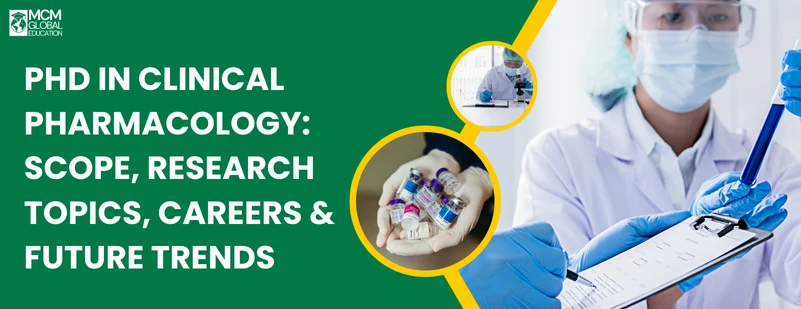The world of drug development and precision medicine is rapidly evolving, and at the forefront of this progress lies clinical pharmacology. If you are passionate about optimizing drug therapy, understanding drug–human interactions, and contributing to innovative treatments, pursuing a PhD in Clinical Pharmacology can be a transformative step.
This advanced degree not only prepares you for impactful research but also opens doors in academia, the pharmaceutical industry, and regulatory agencies. In this blog, we’ll cover everything you need to know about a PhD in Clinical Pharmacology—from admission requirements and research topics to career prospects and future trends.
Table of Contents
What is a PhD in Clinical Pharmacology?
A PhD in Clinical Pharmacology is a research-intensive doctoral program that trains students to bridge the gap between laboratory discoveries and patient care. Unlike a traditional pharmacology PhD focused on molecular mechanisms, this program emphasizes bench-to-bedside translation, drug evaluation in humans, and optimization of therapeutic strategies.
Key Highlights of a PhD in Clinical Pharmacology
- Duration: Typically 3–5 years (full-time)
- Focus: Translational research, clinical trials, personalized medicine
- Outcomes: Publications, patents, and expertise in drug development and safety
Admission Requirements
To pursue a PhD in Clinical Pharmacology, candidates typically need:
- Educational Background: Master’s in Pharmacy, Pharmacology, Medicine, Biotechnology, or related fields
- Research Experience: Prior laboratory or clinical research work
- Exams: GRE (in the U.S.), TOEFL/IELTS (for international applicants)
- Application Documents: Statement of purpose, CV, academic transcripts, research proposal, recommendation letters
Program Structure and Funding
Most PhD programs follow a structured yet flexible format:
| Year | Focus Area | Activities |
|---|---|---|
| 1 | Foundation | Coursework in pharmacology, biostatistics, clinical trial design |
| 2–3 | Research Development | Literature review, lab rotations, research proposal defense |
| 3–4 | Independent Research | Data collection, clinical or lab studies, conference presentations |
| 4–5 | Dissertation | Writing, publishing, and thesis defense |
Funding Options
Many universities offer fully funded PhD programs in clinical pharmacology, which include:
- Tuition waivers
- Monthly stipends
- Research assistantships or teaching assistantships
- External scholarships (NIH, DAAD, Erasmus, etc.)
Research Areas in Clinical Pharmacology
The heart of a PhD in Clinical Pharmacology lies in its research. Students can explore a wide range of topics:
Core Research Areas
- Pharmacogenomics and Pharmacogenetics – how genetic variations affect drug response
- Drug Metabolism & Transport – mechanisms of absorption, distribution, and clearance
- Pharmacoepidemiology – studying drug safety and effectiveness in populations
- Neuropharmacology & Cardiovascular Pharmacology – specialized therapeutic areas
- Therapeutic Drug Monitoring (TDM) – optimizing doses in real patients
Emerging Trends
- Pharmacoepigenetics: How epigenetic changes alter drug response
- Network Pharmacology: Understanding multi-target drug actions
- AI in Drug Discovery: Machine learning for predicting drug–drug interactions
- Model-Informed Precision Dosing (MIPD): Individualized dosing strategies
Choosing a Research Topic
Selecting the right research topic is crucial for your PhD in Clinical Pharmacology.
Popular PhD Topics
| Research Area | Example Topic |
|---|---|
| Pharmacogenomics | Impact of CYP450 polymorphisms on antidepressant efficacy |
| Drug Delivery | Nano-formulations for targeted cancer therapy |
| Pharmacoepidemiology | Long-term safety of biologics in autoimmune disorders |
| Clinical Trials | Adaptive trial designs in rare diseases |
| Pharmacoeconomics | Cost-effectiveness of personalized medicine |
Tips for Choosing Your Topic:
- Align with your interests and faculty expertise
- Choose a research gap with clinical relevance
- Ensure availability of data, patients, or lab resources
- Stay future-oriented—pick a field gaining momentum (e.g., AI-driven pharmacology)
Skills and Competencies Developed
During a PhD in Clinical Pharmacology, students gain advanced technical and professional skills:
- Scientific Skills: Experimental design, pharmacokinetics, data analysis
- Clinical Research: Conducting trials, regulatory compliance, bioethics
- Computational Skills: Bioinformatics, pharmacometrics, AI in drug discovery
- Professional Development: Grant writing, publications, presentations, teaching
Career Opportunities After a PhD in Clinical Pharmacology
Graduates of this program are in high demand across multiple sectors:
| Career Path | Role Examples |
|---|---|
| Academia | Professor, Research Scientist, Principal Investigator |
| Pharmaceutical Industry | Clinical Pharmacologist, Drug Development Scientist, Pharmacometrician |
| Regulatory Agencies | FDA/EMA Reviewer, Policy Advisor, Drug Safety Specialist |
| Healthcare | Clinical Consultant, Precision Medicine Specialist, Pharmacovigilance Officer |
Salary Outlook
- Academia: $70,000–$100,000/year
- Industry (Pharma/Biotech): $90,000–$140,000/year
- Regulatory/Government: $80,000–$120,000/year
Future Trends in Clinical Pharmacology
The next decade promises exciting opportunities for those with a PhD in Clinical Pharmacology.
- Precision Medicine: Tailoring treatments to individual genetic and epigenetic profiles
- Drug Repurposing: Finding new uses for existing drugs (e.g., COVID-19 therapies)
- Polypharmacology: Designing drugs that target multiple pathways simultaneously
- Digital Health Integration: Using wearables and real-world data to track drug outcomes
- AI & Big Data: Leveraging machine learning to predict side effects and optimize therapies
Application Tips for PhD Programs
Securing admission into a top PhD in Clinical Pharmacology program requires strategy.
Step 1: Build a Strong Academic Profile
- High GPA in pharmacology/related fields
- Research publications or internships
Step 2: Prepare a Strong Application
- SOP: Highlight passion for clinical research and translational medicine
- Research Proposal: Well-defined and innovative
- References: Secure recommendations from research mentors
Step 3: Target the Right Institutions
- Look for faculty whose research aligns with your interests
- Check funding opportunities before applying
FAQs About PhD in Clinical Pharmacology
Q1: How long does a PhD in Clinical Pharmacology take?
Typically 3–5 years, depending on research complexity.
Q2: Can I do this program part-time?
Rarely—most programs are full-time due to research intensity.
Q3: Is funding available?
Yes, many programs are fully funded with stipends.
Q4: Do I need a medical degree?
Not always—a strong background in pharmacy, pharmacology, or biomedical sciences is sufficient.
Q5: What’s the difference between a PhD in Pharmacology and Clinical Pharmacology?
1. Pharmacology: More basic science and lab-focused
2. Clinical Pharmacology: Patient-focused, translational, and applied research
Conclusion
A PhD in Clinical Pharmacology is not just an academic journey—it’s an opportunity to influence the future of medicine. From drug discovery to personalized dosing, your research can directly impact patient outcomes and global healthcare.
With strong funding opportunities, diverse research topics, and excellent career prospects, this program is ideal for anyone passionate about advancing medical science.
If you’re considering applying, now is the time to prepare your research interests, connect with faculty mentors, and step into a field shaping the future of personalized medicine and drug innovation.























